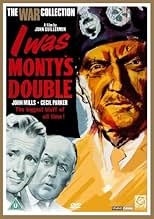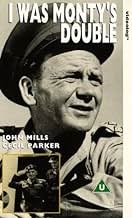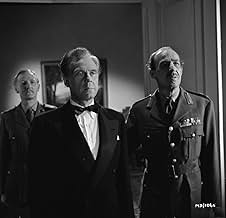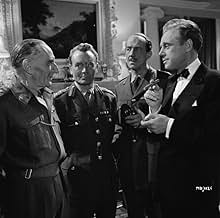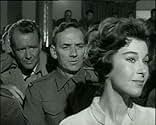I Was Monty's Double
- 1958
- 1h 41min
CALIFICACIÓN DE IMDb
6.9/10
1.8 k
TU CALIFICACIÓN
Agrega una trama en tu idiomaDuring World War II, a British actor impersonates Field Marshal Montgomery in order to confuse German intelligence.During World War II, a British actor impersonates Field Marshal Montgomery in order to confuse German intelligence.During World War II, a British actor impersonates Field Marshal Montgomery in order to confuse German intelligence.
- Dirección
- Guionistas
- Elenco
- Premios
- 1 nominación en total
M.E. Clifton James
- M.E. Clifton James
- (as M. E. Clifton James)
- …
Kenneth J. Warren
- F
- (as Kenneth Warren)
- …
- Dirección
- Guionistas
- Todo el elenco y el equipo
- Producción, taquilla y más en IMDbPro
Opiniones destacadas
At the fag-end of the 50's, a generation of long-demobbed soldiers were still trying to cut it in uniform, in a spate of cheap black-and-white war films. More convincing than most was the unknown star of this true story, a minor Australian actor who had been rejected by the entertainment services, and was reluctantly pen-pushing in the pay office, when someone noticed that he was a dead ringer for Montgomery.
This was in the run-up to D-Day, when the allies were desperate to draw enemy attention away from Normandy as the obvious invasion zone. Might a Monty-lookalike be able to fool German intelligence by touring North Africa, as though preparing for a big Mediterranean landing instead?
The actor in question, M.E. Clifton James, is secretly employed as a driver on Monty's staff, in order to get close enough to study his speech and mannerisms. But he doubts his own ability to replicate the character and personality of the great man, not least because 'Jimmy' is a chain-smoking alcoholic. Eventually, jolly optimist John Mills persuades him to go through with it, and suddenly he's stepping off a plane in Gibraltar, under scrutiny from enemy agents (one of them brilliantly sinister, as played by Marius Goring), as well as certain officers who remember Monty from before the war.
Defying many attempts on his life, Jimmy overcomes his desperate shyness, and learns to take massed salutes from whole armies. Then all too soon, D-Day has come and gone, his one brief star-performance is over, and it's back to the humble pay office. Except... they felt it necessary to bolt-on a false ending, about which we can reveal nothing, except that it never happened.
As for the real-life outcome, we have to face the disappointing fact that it was only part of a much larger decoy operation, which did throw the enemy into some confusion, but reports of Jimmy's own effort reaching Hitler's desk seem to be wishful thinking.
The film displays some recognisable weaknesses of those low-budget productions. The over-long opening section is taken up with John Mills' various flirtations, whose only consequence for the story is that his humourless boss (Cecil Parker) decides to replace their seductive secretary with the ugly-beautiful Barbara Hicks, in some ways more arresting. And the way Mills and Parker chat freely in public about top secret plans will grate on the ear of anyone who has worked in intelligence. No war-film of its day was complete without the stuffed-shirt spoilsport Allan Cuthbertson, who duly pops-up here, as does the perennial plug-ugly sergeant Anthony Sagar. Jimmy's one meeting with Monty is awkwardly dodged; we simply cut away from him on the steps of the general's caravan, although split-screen techniques had long since enabled an actor to shake hands with his own double (try the 1937 'Prisoner of Zenda').
None of this really detracts from the joy of the film, principally the deeply-believable performance of a professional actor, acting himself acting Monty. Sympathy and charm shine through this modest man, who seems to have been shabbily treated after the war, when he was reduced to the dole. Hopefully this popular film brought a little benison for the five short years that remained to him.
This was in the run-up to D-Day, when the allies were desperate to draw enemy attention away from Normandy as the obvious invasion zone. Might a Monty-lookalike be able to fool German intelligence by touring North Africa, as though preparing for a big Mediterranean landing instead?
The actor in question, M.E. Clifton James, is secretly employed as a driver on Monty's staff, in order to get close enough to study his speech and mannerisms. But he doubts his own ability to replicate the character and personality of the great man, not least because 'Jimmy' is a chain-smoking alcoholic. Eventually, jolly optimist John Mills persuades him to go through with it, and suddenly he's stepping off a plane in Gibraltar, under scrutiny from enemy agents (one of them brilliantly sinister, as played by Marius Goring), as well as certain officers who remember Monty from before the war.
Defying many attempts on his life, Jimmy overcomes his desperate shyness, and learns to take massed salutes from whole armies. Then all too soon, D-Day has come and gone, his one brief star-performance is over, and it's back to the humble pay office. Except... they felt it necessary to bolt-on a false ending, about which we can reveal nothing, except that it never happened.
As for the real-life outcome, we have to face the disappointing fact that it was only part of a much larger decoy operation, which did throw the enemy into some confusion, but reports of Jimmy's own effort reaching Hitler's desk seem to be wishful thinking.
The film displays some recognisable weaknesses of those low-budget productions. The over-long opening section is taken up with John Mills' various flirtations, whose only consequence for the story is that his humourless boss (Cecil Parker) decides to replace their seductive secretary with the ugly-beautiful Barbara Hicks, in some ways more arresting. And the way Mills and Parker chat freely in public about top secret plans will grate on the ear of anyone who has worked in intelligence. No war-film of its day was complete without the stuffed-shirt spoilsport Allan Cuthbertson, who duly pops-up here, as does the perennial plug-ugly sergeant Anthony Sagar. Jimmy's one meeting with Monty is awkwardly dodged; we simply cut away from him on the steps of the general's caravan, although split-screen techniques had long since enabled an actor to shake hands with his own double (try the 1937 'Prisoner of Zenda').
None of this really detracts from the joy of the film, principally the deeply-believable performance of a professional actor, acting himself acting Monty. Sympathy and charm shine through this modest man, who seems to have been shabbily treated after the war, when he was reduced to the dole. Hopefully this popular film brought a little benison for the five short years that remained to him.
With some considerable dramatic license the story of one of the best intelligence operations of World War II is told in I Was Monty's Double. The film is based on the book by actor F.E. Clifton James who plays himself and Bernard Law Montgomery as he did for a fateful few weeks in World War II.
John Mills and Cecil Parker two officers from British Intelligence become James's handlers in the terminology we would use today. Mills while attending a service variety show sees James do a walk on as Field Marshal Montgomery and is struck by the audience reaction to him. The germ of an idea comes to Mills to have the actor play Montgomery for the widest audience possible, to give him a grand tour of the various fronts of the war. This in order to divert Nazi attention from the United Kingdom where the cross channel invasion is being prepared and Montgomery very much a part of the planning. In fact you can see some of his real role there in the TV mini-series Ike and in The Longest Day.
Of course James carried the masquerade off beautifully. My favorite scene is James at a press conference in Cairo with allied war correspondents where he's at first hesitant with this cynical bunch, but grows in confidence and wins them over with a speech that you might have seen the real Bernard Law Montgomery deliver during his lifetime.
Two others who give noteworthy performances in the film are Michael Hordern as the Governor General of Gibraltar and Marius Goring who is a German agent whom Mills, Parker and James deliberately give misinformation to in order to confirm how effective the plan is working.
The whole business in the end is pure fiction which I won't reveal, but that doesn't detract from making this a first rate account of an amazing adventure. One even Stephen Spielberg would envy.
John Mills and Cecil Parker two officers from British Intelligence become James's handlers in the terminology we would use today. Mills while attending a service variety show sees James do a walk on as Field Marshal Montgomery and is struck by the audience reaction to him. The germ of an idea comes to Mills to have the actor play Montgomery for the widest audience possible, to give him a grand tour of the various fronts of the war. This in order to divert Nazi attention from the United Kingdom where the cross channel invasion is being prepared and Montgomery very much a part of the planning. In fact you can see some of his real role there in the TV mini-series Ike and in The Longest Day.
Of course James carried the masquerade off beautifully. My favorite scene is James at a press conference in Cairo with allied war correspondents where he's at first hesitant with this cynical bunch, but grows in confidence and wins them over with a speech that you might have seen the real Bernard Law Montgomery deliver during his lifetime.
Two others who give noteworthy performances in the film are Michael Hordern as the Governor General of Gibraltar and Marius Goring who is a German agent whom Mills, Parker and James deliberately give misinformation to in order to confirm how effective the plan is working.
The whole business in the end is pure fiction which I won't reveal, but that doesn't detract from making this a first rate account of an amazing adventure. One even Stephen Spielberg would envy.
Apparently using doubles as decoys to fool the enemy is nothing new. It takes place even now.
During World War 2 there were several Winston Churchill lookalikes in good employment.
I first saw this film as a kid and thought it was fantastically entertaining. The film takes place a few months before the D-Day landings are due to take place.
The British government wants to have a campaign of misinformation and spread rumours that the landings might take place at a locations other than Normandy
Clifton James was an actor who had an uncanny resemblance to General Montgomery and is enticed by John Mills to impersonate the man himself in order to dupe the Germans.
The film is a straightforward adaptation of James real life story although more tension and humour has been added as well as a kidnapping storyline at the latter part of the movie which did not actually occur.
Also in real life James was fond of a drink and smoke unlike the real Monty.
It is a shame that Clifton James did not get more acting roles after the war although this film does mark his contribution to the war effort.
During World War 2 there were several Winston Churchill lookalikes in good employment.
I first saw this film as a kid and thought it was fantastically entertaining. The film takes place a few months before the D-Day landings are due to take place.
The British government wants to have a campaign of misinformation and spread rumours that the landings might take place at a locations other than Normandy
Clifton James was an actor who had an uncanny resemblance to General Montgomery and is enticed by John Mills to impersonate the man himself in order to dupe the Germans.
The film is a straightforward adaptation of James real life story although more tension and humour has been added as well as a kidnapping storyline at the latter part of the movie which did not actually occur.
Also in real life James was fond of a drink and smoke unlike the real Monty.
It is a shame that Clifton James did not get more acting roles after the war although this film does mark his contribution to the war effort.
"I Was Monty's Double" is based on the book of the same name, by M. E. Clifton James, an Australian actor in the service who is drafted to impersonate General Montgomery. Though some dramatic license is taken, what makes the film fun is that James plays himself and the historical events are true.
In order to make the Nazis believe that D-Day is taking place in Gibraltor, James, who makes an appearance at the end of a show as Montgomery, is asked to impersonate the general.
He bears a strong resemblance - so strong, in fact, that when he comes out onto the stage, he gets a standing ovation and rousing cheers. His recruiters, played by John Mills and Cecil Parker, are hoping the troops have the same reaction.
They arrange for James to be assigned as a driver so that he can observe Montgomery at close quarters and copy his mannerisms. James, however, finally tells Harvey and Logan (Mills and Parker) that he can't do it. He's never led a command.
Logan is dumbstruck. "You won't be doing any actual commanding," he objects. A consummate actor, James replies, "You don't understand. I have to have it inside." However, he's so good that he is able to find the ego and leadership qualities internally to carry it off.
The film is directed by John Guillerman with emphasis on the humor. Marius Goring plays a Nazi spy who thinks he's in tight with the Allies on Gibraltor. "We feed him all kinds of garbage," the top brass says. "He's faster than calling Berlin." The whole bit at the end is fiction, but it doesn't deter from a fascinating story. Highly recommended.
In order to make the Nazis believe that D-Day is taking place in Gibraltor, James, who makes an appearance at the end of a show as Montgomery, is asked to impersonate the general.
He bears a strong resemblance - so strong, in fact, that when he comes out onto the stage, he gets a standing ovation and rousing cheers. His recruiters, played by John Mills and Cecil Parker, are hoping the troops have the same reaction.
They arrange for James to be assigned as a driver so that he can observe Montgomery at close quarters and copy his mannerisms. James, however, finally tells Harvey and Logan (Mills and Parker) that he can't do it. He's never led a command.
Logan is dumbstruck. "You won't be doing any actual commanding," he objects. A consummate actor, James replies, "You don't understand. I have to have it inside." However, he's so good that he is able to find the ego and leadership qualities internally to carry it off.
The film is directed by John Guillerman with emphasis on the humor. Marius Goring plays a Nazi spy who thinks he's in tight with the Allies on Gibraltor. "We feed him all kinds of garbage," the top brass says. "He's faster than calling Berlin." The whole bit at the end is fiction, but it doesn't deter from a fascinating story. Highly recommended.
It helped in this film to have the actual person that really did impersonate Montgomery. Clifton James give a good performance as both himself and Montgomery. An excellent Bryan Forbes script that is well delivered by Cecil Parker and John Mills.
¿Sabías que…?
- TriviaThe screenplay omits David Niven's part in the real operation. It was he, working for the Army's film unit as a Lieutenant Colonel, who first made contact with M.E. Clifton James. His role is taken in this movie by Major Harvey (Sir John Mills).
- ErroresSoldiers refer to the Queen's Regulations, whereas at this time they should be the King's Regulations (King George VI).
- Citas
[last lines]
Civilian: [angrily after bumping into James outside a cinema] Why don't you watch where you're going! Who do you think you are?
Major Harvey: [to James after the two of them and Logan walk away from the man] Yes, who do you think you are? Monty?
[the three of them start to laugh as they continue walking along the crowded street]
- Créditos curiososThe story you are about to see is the story of one of the boldest deceptions of our time in which Meyrick Clifton James, late of Her Majesty's Pay Corps, re-enacts his own real-life role. The Producer is deeply grateful to H. E. The Governor and Commander-in-Chief and those member of the Administration and Services at Gibraltar in March 1958, who rendered their invaluable assistance in the reconstruction of certain scenes of this film.
- ConexionesReferenced in Los vengadores: Epic (1967)
Selecciones populares
Inicia sesión para calificar y agrega a la lista de videos para obtener recomendaciones personalizadas
- How long is Hell, Heaven or Hoboken?Con tecnología de Alexa
Detalles
- Fecha de lanzamiento
- País de origen
- Idiomas
- También se conoce como
- Hell, Heaven or Hoboken
- Locaciones de filmación
- Productoras
- Ver más créditos de la compañía en IMDbPro
- Tiempo de ejecución
- 1h 41min(101 min)
- Color
- Relación de aspecto
- 1.85 : 1
Contribuir a esta página
Sugiere una edición o agrega el contenido que falta

